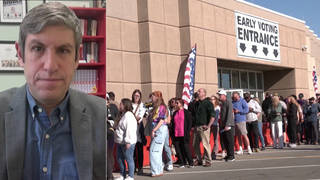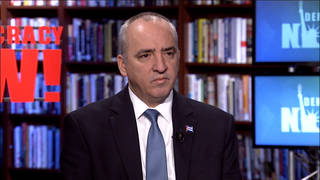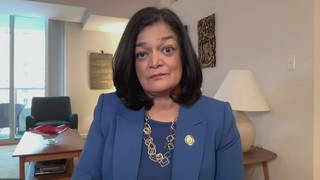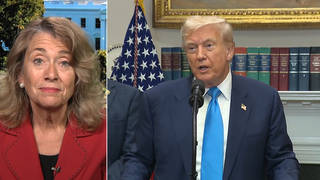
Guests
- Neal Katyallawyer representing the businesses that initiated the tariff lawsuit against Trump.
- Dan RayfieldOregon attorney general, leading the multistate lawsuit against Trump’s tariffs.
A federal appeals court struck down most of President Trump’s sweeping tariffs Friday, saying they have no legal basis. The decision could undo many of Trump’s tariffs from “Liberation Day” in April, as well as earlier tariffs against Canada, Mexico and China. In its ruling, the appeals court called levying tariffs “a core Congressional power,” but the White House had argued the president has authority to impose tariffs without Congress based on the 1977 International Emergency Economic Powers Act. The tariffs will remain in effect until October, giving the Trump administration time to bring the case to the Supreme Court. The decision encompasses two different cases that had challenged the tariffs: one brought by a group of U.S. states, led by Oregon, and the other brought by a group of businesses.
“It’s a sweeping decision that unequivocally rebukes President Trump’s idea that he can impose tariffs on American consumers on his own without the approval of the Congress,” says attorney Neal Katyal, who represents the businesses that initiated the tariff lawsuit.
Oregon Attorney General Dan Rayfield says his state challenged the tariffs because of their economic impact since “about 70% to 80%” of the costs are paid by U.S. consumers. “I really think we have to start calling them regressive taxes,” Rayfield says.
Transcript
AMY GOODMAN: President Trump has vowed to take his tariff fight to the Supreme Court, after a federal appeals court Friday struck down most of the tariffs imposed by the White House, including the “Liberation Day” tariffs imposed in April, as well as earlier tariffs against Canada, Mexico and China. The decision upholds an earlier ruling by the U.S. Court of International Trade. [In] its ruling, the appeals court called tariffs, quote, “a core Congressional power.”
The White House argued the president can unilaterally impose tariffs based on powers granted by the 1977 International Emergency Economic Powers Act, or IEEPA, which has historically been used to impose sanctions. But [in] its decision, the appeals court wrote, quote, “It seems unlikely [that] Congress intended, in enacting IEEPA, to depart from its past practice and grant the President unlimited authority to impose tariffs. The statute neither mentions tariffs (or any of its synonyms) nor has procedural safeguards that contain clear limits on the President’s power to impose tariffs,” unquote. The tariffs will remain in effect until October.
Trump wrote on Truth Social, quote, “If allowed to stand, this Decision would literally destroy the United States of America,” unquote.
The decision encompasses two different cases that challenge the tariffs, one brought by a group of U.S. states, led by Oregon, and the other brought by a group of businesses.
In a moment, we’ll speak with Dan Rayfield, the attorney general of the state of Oregon, but first to Washington, D.C., to speak with Neal Katyal. He argued the case for businesses. He was previously acting solicitor general in the Obama administration and has argued over 50 cases before the Supreme Court. He’s also a law professor at Georgetown University.
Neal, welcome back to Democracy Now! You’ve called this decision, quote, “a win for our Constitution and founders’ vision of what America is.” Lay out what happened, what exactly this decision means.
NEAL KATYAL: Yeah, I think it’s a sweeping decision that, you know, unequivocally rebukes President Trump’s idea that he can impose tariffs on American consumers on his own without the approval of the Congress. You know, our Constitution, in Article I, Section 8, expressly gives the power to tariff to Congress, not to the president. And so, the president basically tried to do this on his own, saying, “Well, Congress in 1977 passed a law called IEEPA, which is about emergency economic powers, and that gives me the power to have an unlimited tariff.” And as you just heard, the court just resoundingly rejected that idea, that it doesn’t mention the word “tariffs” in it, and, no, Congress has never given carte blanche authority to the president to tariff the American consumer.
And the Nonpartisan Tax Foundation has said, after studying President Trump’s tariffs, that they are the largest increase on American consumers — the largest tax increase on American consumers since Bill Clinton in 1993. And, of course, that was done through Congress. So, that’s simply what the opinion says. If the president really thinks these tariffs are so important, as you all just read, that the country will be destroyed without them, his choice is easy: just go to the Congress and get them approved.
JUAN GONZÁLEZ: [inaudible] has the Congress delegated to the president, in your reading of the law, up ’til now?
NEAL KATYAL: Yeah, so, they certainly didn’t delegate that kind of unlimited power. When Congress gives the president power over tariffs, they always have hard and fast limits. So, for example, Section 122 of the Trade Act says the president has a temporary power to increase tariffs for 150 days by 15%. What did President Trump do? He increased tariffs 50%, 150% indefinitely. And that’s a kind of coloring outside of the lines that the court found so problematic last week in its decision.
JUAN GONZÁLEZ: And why did the court give only 45 days for the government to go to the Supreme Court? Typically, it’s a 90-day stay?
NEAL KATYAL: Yeah, we were very grateful to see that the court, on its own, did that. And I think it’s — you know, obviously, they have their reasons, but my guess is it’s because they recognize the importance of this issue and that it should be decided quickly. I’m privileged to represent a group of small businesses who are struggling every day to understand what these rules are, how — you know, what these tariffs are likely to be, will there be, you know, refunds on these illegal tariffs in the future — all sorts of really difficult questions. And I think the Court of Appeals did something really good by saying, “Look, government, normally you have 90 days to go the Supreme Court. We’re only giving you 45.”
AMY GOODMAN: Explain, overall, what tariffs would be lifted. Explain how this works, this timeline. And what do you expect the Supreme Court to do?
NEAL KATYAL: Well, so, the president has two choices right now. One is he could do what the court last week said he should do, which is to go to Congress and seek their approval. It’s our hope that he will do that and — you know, and then Congress can decide. I note that President Trump tried to get approval before, when he was president the first time, and Congress said no. But, you know, that’s a debate that I think the American people should have, that the American Congress should have.
The other option is, of course, he could go to the U.S. Supreme Court. He could try as early as this week, and the court could hear the case pretty quickly, in a matter of a month or two, and then resolve the case pretty quickly.
So, I think those are the paths that are available right now to the administration. But right now these tariffs have been declared illegal and unconstitutional by the nation’s second-highest court.
JUAN GONZÁLEZ: And how do you expect the Supreme Court to rule, given the six-judge conservative majority on the court?
NEAL KATYAL: Well, I’m not going to predict how the court will rule. We think the case here is overwhelming. But I’ve heard these questions all the time in my past cases which I’ve litigated in the Supreme Court — “Oh, the court is too conservative,” or something. I’m reminded — I think I was even on this program when I argued Moore v. Harper, which was a case challenging the Republican National Committee’s theory of the independent state legislature doctrine, which, if they had won that case, would have entrenched Republican rule for perhaps decades. And everyone said, “Oh, the Supreme Court, you know, they’re in the pocket of Republicans,” and so on. And, you know, I never thought that was right. I thought that the Supreme Court would look at this by understanding what is the original intent of the Constitution when it comes to elections. And lo and behold, six to three, the Supreme Court rejected that Republican theory there.
I think a similar result is very possible here. Again, I’m not here to predict what the court will do. But I think if they look at, as I suspect they will, the original understanding of the Constitution, the fact that our founders cared so much about the taxation and tariff power to put it in expressly Congress’s control and strip the president of any power over that, because they knew that every king and despot always wants to use the tax power — I mean, think Boston Tea Party, think so many other things in our revolutionary history. The idea that the president could come along and just impose taxes and tariffs on the American people on his own would have turned the founders over in their graves. So, we are going to make that case to the Supreme Court, should this become a Supreme Court case, and we are optimistic in the strength of that argument.
AMY GOODMAN: Neal Katyal, we want to thank you so much for being with us, law professor at Georgetown University, argued the case before the court which has now struck down Trump’s tariffs, but they can remain until October. We will, of course, continue to follow this story, as we will turn right now to Dan Rayfield, Oregon attorney general. He’s leading the multistate lawsuit against Trump’s tariffs. He’s joining us from Salem, Oregon.
Oregon Attorney General, thanks so much for being with us. You’re the one who brought this case. Explain why you brought it, and the significance of the ruling of the court.
ATTORNEY GENERAL DAN RAYFIELD: Yeah, I think when people think about tariffs, or you hear “tariffs,” that word, in your community, you don’t feel that that’s something that’s impacting you as a person just walking through your community. In fact, if you listen to President Trump, he claims and brags that all these costs are being paid by foreign businesses. And the fact is that when you look at it, when you look at people that we trust, Goldman Sachs, all these others, JPMorgan, they show that about 70 to 80% of those tariffs are paid by Americans. And so, when you thought about the importance of this case, especially when cost of living is such a huge thing for Americans right now, and you see a president using and abusing an emergency power that had never been used for tariffs before, it was a real easy decision for us to move forward.
Here in Oregon, I was hearing from businesses that were having their products removed off the shelves in Canada. We’re seeing the costs of goods that the state was purchasing increasing. And it was just only the beginning, when we started this journey back in February and really started evaluating the impact. So it made absolute sense for us to get involved and say, “Hey, Mr. President, if you want to do tariffs, that’s great. Just do them the right way. Do them the way that Congress intended.”
JUAN GONZÁLEZ: And the first court to hear this case was the Court of International Trade in New York, where there were two Republican judges, yet the court voted unanimously against these tariffs. What’s your sense of how this will continue to work its way up the judicial chain here?
ATTORNEY GENERAL DAN RAYFIELD: Yeah, and the one thing that I never got when I became attorney general was a crystal ball, so just know that. But as you look at this, I think what people should find interesting, that you have 11 judges that have all ruled that the manner in which the president has tried to implement his tariffs is unconstitutional, it went beyond the safeguards that Congress intended for consumers. They put these sideboards. Congress put sideboards in place to protect consumers, to protect all of us, to protect our businesses, our economy. And the president doesn’t want to use those, so he went around them. So it wasn’t surprising that you had Republican or judges appointed by Republicans saying, “Hey, you went too far here. This isn’t what Congress intended. This isn’t what our Constitution intended.” We had one judge in the Federal Circuit Court of Appeals that actually ruled — and appointed by a Republican, that ruled that these were unconstitutional, as well. So, I don’t think that these are really Democratic- or Republican-leaning issues. I mean, these are foundational democratic principles that we’re trying to uphold.
AMY GOODMAN: I wanted to turn to the White House trade adviser, Peter Navarro, speaking about the tariffs lawsuit on Monday.
PETER NAVARRO: This case is arguably the single most important economic case that has ever come before the Supreme Court. If the lower court’s ruling is upheld, President Trump has correctly said that will be the end of the United States. … I think we’re in very good shape. Bottom line is, we’re optimistic that the Supreme Court will rule on this. We don’t have to — the tariffs will remain in place at least to October, and perhaps beyond, until the Supreme Court rules on this.
AMY GOODMAN: So, that’s Peter Navarro, the top trade adviser to President Trump, the convicted felon who was pardoned by Trump. Dan Rayfield, Oregon attorney general, your response?
ATTORNEY GENERAL DAN RAYFIELD: I would just say I wish I had the moral flexibility to make such bold, inaccurate statements to the American public, the way that the Trump administration does. It’s absolutely wild to sit there and say that that is going to destroy America. I would argue giving all of the power to tax — because that’s what these are: These are a tax on American people — and giving all of that power to the president, without the ability of Congress to curb it, is more un-American than anything that is going on right now. This case is incredibly important for the American people and our autonomy and Congress’s autonomy. It’s wild, the things they say. But again, this is an administration that truly lives on a hyperbole and making wild statements like this. It’s just factually inaccurate.
And again, remember, like, as we’re going through the stores, you’re seeing it right now. The prices for school supplies — my son starts school tomorrow — the prices of clothes, these things are absolutely increasing every week in our stores. Incredibly wild for them to make statements like this.
And remember — and that’s the other thing — if you do care about trade, if you do care about how these things are being implemented, remember that no other president has needed to do tariffs this way. Every other president has used the regular statutes. In fact, Donald Trump used the other statutes when he was implementing tariffs. It’s been done before. We’ve entered into successful trade agreements lawfully, constitutionally, the way that the Constitution and Congress intended.
JUAN GONZÁLEZ: And, Attorney General, you mentioned that this is — these tariffs are, in effect, a tax. But it’s also a regressive tax, isn’t it, hitting more the folks on the lower income strata of American society?
ATTORNEY GENERAL DAN RAYFIELD: Oh, absolutely. And this is what Republicans are trying to do to us right now. On one hand, you see this Big Beautiful Bill — and I don’t even like calling it that — where they’re yanking away healthcare benefits from Americans. They are yanking away food assistance benefits, on the one hand. And on the other hand, they are passing this hidden regressive tax that’s impacting vulnerable Americans more than the wealthy. It is an entire reshaping of the American economy that is going on right now. And the wild thing that is this: They are doing it without congressional approval when it comes to these tariffs. Again, I really think we have to start calling them regressive taxes, because tariffs makes it feel like foreign businesses are paying.
AMY GOODMAN: Dan Rayfield, we want to thank you so much for being with us. I wanted to ask you one unrelated question. In our next segment, we’re going to be going to the border to talk about the court blocking the Trump administration from deporting some almost 700 unaccompanied Guatemalan children. But I wanted to ask you about Oregon being a sanctuary state and what exactly that means. Oregon Governor Tina Kotek pushed back against claims from the Trump administration that Oregon is obstructing federal immigration enforcement efforts because of its sanctuary law. Can you talk about what that means for Oregon and the level of cooperation between ICE agents, these raids, and local and state authorities?
ATTORNEY GENERAL DAN RAYFIELD: Yeah. Really simply put, in Oregon, we’ve had sanctuary state laws since the '80s, right? They have coexisted between seven presidential administrations, and they've coexisted peacefully. And really, the idea and the spirit behind our sanctuary laws here in Oregon is that we want our local law enforcement doing the things that keep our communities safe. We don’t want them doing immigration. And we want people to feel safe being able to talk to public safety, local law enforcement about the things that are going on in their communities, right? That keeps us all safe. When you’ve got a victim of crime, we want witnesses to feel comfortable going to our courts to be able to testify to keep our communities safe. And so we’ve enacted these laws, and they were enacted in the ’80s. And in Oregon, they were nearly unanimous. Republicans and Democrats overwhelmingly supported these policies.
And so, it’s a relatively new thing to have the federal government come in and try and, effectively, force us to use state resources to effectuate immigration laws. And that’s what these laws are designed to protect and prohibit. They’ve been upheld in Oregon in the past as being constitutional, and so we expect that to continue, moving forward. Right now there’s a policy disagreement between the federal government and the states about how they want to interact. But I feel very confident in saying that Oregonians want their law enforcement going after the essential public safety things — burglary, murder, the big crimes in our communities — to make sure that we’re keeping our communities safe. And we want people in Oregon feeling comfortable and safe talking to law enforcement and going to our courthouses to testify to keep our communities safe.
AMY GOODMAN: Dan Rayfield, we want to thank you for being with us, Oregon attorney general, speaking to us from Salem, Oregon. He’s leading a multistate lawsuit against Trump’s tariffs.
When we come back, the Trump administration tried to deport as many as 700 unaccompanied Guatemalan children in the middle of the night over Labor Day weekend. We’ll speak with the lawyer who helped stop them — well, for now. Stay with us.
[break]
AMY GOODMAN: “Hielo,” “Ice,” by La Santa Cecilia in our Democracy Now! studio.













Media Options